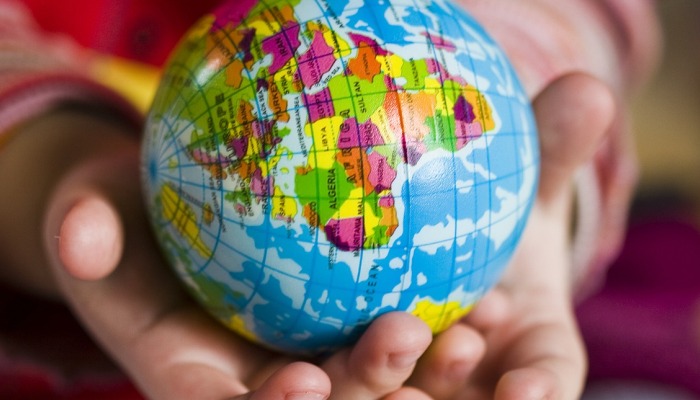Prospects and opportunities for the success of the African continent in empowering youth

Prepared by the researcher : Nour Tariq Jamal Al-Din – Master’s researcher at the Faculty of African Studies, Cairo University
Democratic Arab Center
The fact that the African continent has the highest rates of youth (compared to the total population) at the global level, who represent about 60% (youth under 25 years of age) of the total African population, gives it a demographic advantage that is no less important than the natural resources and components that the brown continent enjoys, which made it an arena of intense competition between international powers throughout the ages; Since youth are the main pillar for building nations, and with their help achievements are achieved, in addition to their pivotal role in achieving the desired development goals.
In this context, it is estimated that the number of Africans between the ages of 15 and 34 reached about 454.5 million in 2020, and the total number of Africans under the age of 35 is about one billion, which represents 22.7% of the total number of youth in It is expected that youth in Africa will grow by 181.4% by the year 2100, which will be equivalent to double the entire population of Europe at that time, and Africa is likely to account for half of the number of young people at that time. the world.
Although the enormous human power that the African continent possesses, especially the youth group, has the ability to achieve the desired development in the continent, it has not succeeded in making optimal use of it, in light of the escalation and intertwining of political, economic, social and technological factors that prevented the empowerment of the continent’s youth, and in In this context, the article discusses the obstacles to empowering African youth, the repercussions of their weak empowerment, and the most prominent regional and international initiatives aimed at empowering African youth.
First: Obstacles to youth empowerment
- 1. Poor economic conditions
The deteriorating economic conditions witnessed by most African countries are the main obstacles that prevent the empowerment of youth, as the fragile economy undermines opportunities for quality education and the promotion of technology and innovation, which is one of the main pillars that contribute to developing youth skills, and thus obtaining job opportunities.
It should be noted that the high rates of poverty and unemployment come at the forefront of the obstacles that prevent the empowerment of African youth. About 490 million people in Africa live in extreme poverty, which represents about 36% of the total population of the continent, and 31% of young people between the ages of 25 and 34 fall below the poverty line, while this rate rises among children under 14 years old. to 41%.
In this context, the African continent also suffers from high rates of unemployment, especially among young people, as estimates by the African Development Bank indicated that youth unemployment is twice the rate of adult unemployment, as confirmed by United Nations reports for the year 2017, that youth represent about 60% of the total unemployment rate. Unemployed in Africa, as reported by the International Labor Organization in 2016, the number of young working poor has increased by 80% since the 1990s.
- 2. The fragility of the technological infrastructure in Africa
The African continent suffers from a deficit in technological infrastructure and a lack of information and communication technology, which has become an obstacle to achieving development prospects in the continent. The continent also needs investments of about $3 billion annually to address the deficit it suffers from, in light of the modest capabilities within the continent, as well. The weakness of the technological infrastructure on the continent has become one of the factors that impede the investment process that benefits young people, and thus contribute to enhancing their technological and practical capabilities and capabilities, and Africa also faces the problem of affordability, to the extent that information and communication technology infrastructure may become available, It will not matter if the people of Africa are unable to use it.
It is noteworthy that the African Development Bank (ADB) indicated that the infrastructure on the African continent will require expenditures ranging from 130 to 170 billion dollars until 2025, and the information and communication technology sector alone requires between 4 to 7 billion dollars of it.
The state of progress witnessed by the world, the technological boom and the shift in technological generations, the “third generation” (3G), and then the emergence of the “fourth generation” (4G), showed weak capabilities within Africa, and as a result of the repercussions of the Corona virus, many countries of the world relied on holding events. And events on the use of technology and the Internet, which illustrates the need to support information and communication technology within the continent in a strong and rapid manner.
In the context of technological infrastructure development opportunities in Africa, Google plans to invest $1 billion in African countries over the coming years. This is to ensure access to fast and cheap internet, and it also intends to help emerging companies with the digital transformation of the continent, as it launched an African investment fund, through which it will invest $ 50 million in startups, which will give them access to its employees, network and technologies, and Google will provide $ 10 million. In the form of low-interest loans, to help small businesses and entrepreneurs in Ghana, Kenya, Nigeria and South Africa navigate the economic hardships caused by the coronavirus pandemic.
This, and investing in technological infrastructure within the African continent, and addressing the lack of new technological capabilities, is evidence that the political, civil, economic and social empowerment of youth is an essential tool; To achieve the process of empowering youth, whether with regard to global goals or superior visions and expectations related to prosperity, growth and integration, and the weakness of technological capabilities affects the process of empowering youth, and the weight of their knowledge and technological capabilities, and also benefits the youth group, to be able to keep pace with the scientific and technological progress that leads to the growth of the African continent.
- 3. Weak education and training strategy
Building a strong strategy for education and training within the African continent requires consideration of the state of political and economic stability and adequate infrastructure, which is lacking in many African countries, and impedes the promotion of the skills of the young workforce. Education revenues have declined in the past decade within Africa due to the continent’s lack of skills needed for the labor market for young people, as well as the poor quality of education in Africa. The human development indicators of the United Nations Development Program for the year 2018 indicate the depth of gender disparities in educational participation, especially in Africa. Especially in the Central African Republic, Côte d’Ivoire, Niger and Guinea, which led to a lack of capabilities that affected the poor development of the educational process and the heavy capabilities of young people.
According to the AU Youth Employment Strategy and Agenda 2063, youth should be given the right to access education, employment, and freedom of movement within Africa to achieve their goals and aspirations and contribute to the demographic dividend of the continent.
Within the framework of the growing Chinese influence within the African continent, as China is the main trading partner for Africa, which stimulates African youth to increasingly engage with Beijing, and provides them with new horizons, especially in light of the twenty-fold increase of African students studying in China since 2005, during Recent years, which heralds a boom in experiences for African youth, especially in light of Beijing enjoying many attractions for African youth, relying on solutions and innovations, which are mainly based on added value, value chains, and the ability to shift from agriculture to industrialization through ” Made in China logo.
Second: Regional and international initiatives to empower youth in Africa
- 1. African Union Youth Charter
As part of the African Union’s keenness on youth development, the African Youth Charter (AYC) was adopted 15 years ago, under the auspices of the African Union Youth Envoy and in cooperation with the United Nations Institute for Training and Research (UNITAR); With the aim of involving and empowering young people, and working to enhance their participation in political life, the union also announced that the year 2009 to 2018 is the “African Youth Decade”, and many African countries have sought to create programs to target young people and encourage them to participate in political life.
- 2. Young African Leaders Initiative
It is an initiative launched by the US State Department in 2010, with the support of former President Barack Obama; With the aim of supporting and educating young African leaders, through the activities offered by the US government to invest in the next generation of African youth, the initiative has contributed to the graduation of more than 24,000 African youth, since 2010, and many graduates of the (YALI) initiative have held many positions Leadership, some of which won international awards. A Ghanaian graduate from the Mandela Fellowship, and a Kenyan graduate from the four regional leadership centers won the first and second prizes in the African Innovations Against Coronavirus competition for Africa.com, and a Somali graduate from the Mandela Fellowship Program was nominated for the Nobel Peace Prize in 2019, and the most important programs of the initiative are:
- The Mandela Fellowship in Washington for Young African Leaders, launched in 2014, targets 700 young people between the ages of 25 and 35 to study in the United States, each year, and participate in six-week leadership institutes at American universities.
- Regional Leadership Centers, which are run by the United States Agency for International Development for Regional Leadership Centers. The program has also been expanded to include four regional leadership centers in Ghana, Kenya, Senegal and South Africa. Since 2015, these centers have provided training to more than 20,000 young leaders between the ages of 18 and 35 years old.
- YALI Initiative Network: It is a virtual online community with more than 700,000 members in sub-Saharan Africa. The website provides online content and courses to support young people.
- 3. Young Africa International
This initiative was founded in 1988 in the Netherlands; With the aim of empowering African youth, and developing employment and entrepreneurship skills, it includes several African countries, including: Zimbabwe, Zambia, Mozambique, Botswana, and Namibia, and aims to establish training centers for youth employment in these countries. It also allows local entrepreneurs to run their businesses in a successful environment. Through the establishment of local non-profit organizations to enhance the role of youth, and give them the opportunity to participate in local business, and develop new skills within the work environment, targeting the age group from 15 to 25 years, and the program includes 43 training courses in vocational education in technical, agricultural and commercial skills, and skills In 2017, about 1,980 graduates graduated from the program professionally, and 96% of the program graduates are self-employed.
- 4. African Union Volunteers Program (AU YVC)
The program is one of the most important tools of the African Union, which serves the “Africa 2063” agenda, and works to qualify African youth cadres to work in all countries of the African Union, and seeks to achieve human development goals in Africa, through the exchange of skills, knowledge, creativity and learning, in order to build a strong continent An integrated program that enhances the importance of Africa in the world. The program was launched for the first time on December 3, 2010 in Abuja, Nigeria, in the presence of the Nigerian President, youth ministers of the African Union countries, and representatives of the African Union. It also works to integrate youth with African Union institutions, and involve African youth in the development of the continent. And provide opportunities for young Africans to serve and gain professional experience, and the training period is one year.
- 5. The African Union Roadmap on Investing in Youth
In 2017, the African Union chose to harness the demographic dividend by investing in youth. The African Union’s road map on investing in youth included recognition of the demographic dividend in economic and social development efforts on the continent, by identifying the areas needed for the main investments described as the necessary pillars to enable countries to increase Its ability to harness the demographic dividend in the coming decades, and to ensure the full implementation of both the African Union’s Agenda 2063 and the 2030 Agenda for Sustainable Development, based on several key pillars:
- Employment and entrepreneurship.
- Developing and supporting transformative youth development initiatives, towards building the skills and capabilities of youth in the field of entrepreneurship.
- Developing youth volunteer programs, junior technician youth programs, and various training opportunities.
- Giving African youth the opportunity to come into contact with regional and international organizations.
- Focus on education and skills development.
- Establishing and strengthening regional educational institutions that provide education and exchange opportunities for students throughout Africa.
- Emphasis on organizing training courses to lead and empower youth with the aim of instilling African ideals and aspirations in young people.
- 6. Egyptian initiatives for empowering African youth.
The African Presidential Youth Rehabilitation Program (APLP): The program is an outcome of the recommendations of the World Youth Forum in 2018, in conjunction with Egypt’s presidency of the African Union in 2019; The program aims to bring together African youth of different affiliations and beliefs under one umbrella with the aim of developing youth and building peace. About 100 participants in each batch, and among the most important conditions of the program is that the applicant be a citizen of an African country, and that the applicant’s age ranges between 25 and 45 years.
The project of 1000 African leaders at Cairo University: It is considered one of the most important initiatives launched by Egyptian President Abdel Fattah El-Sisi during the activities of the Africa Forum in December 2018 in Sharm El-Sheikh. 2019.
In light of this, it can be said that the aforementioned regional and international initiatives reflect the efforts of various countries to integrate youth into African societies and enable them to participate in public policy-making. Where Uganda maintains five seats in parliament for youth representatives, in Kenya, there are 12 parliamentary seats for representatives nominated by political parties, including youth, persons with disabilities and workers, in Rwanda, the National Youth Council elects two members of the House of Representatives from youth, and in Morocco, it includes Electoral law, 30 seats are reserved for candidates under the age of 40.
In conclusion, it can be said that empowering African youth and benefiting from them as human resources is the best option for the countries of the continent in facing many challenges. Especially in light of the events and developments taking place in the continent, which requires these countries to support and support youth while giving them the opportunity to access knowledge, develop their skills and abilities, provide an incubating environment for human energies, and work to transform it into an energy that serves society and achieves its goals, while achieving stability, democracy and equality. in rights and duties. Given that the African continent is still facing many challenges that hinder the development process and impede the process of empowering youth in political life within African society, therefore it needs to develop an effective strategy in order to empower youth and transform raw human energies into human cadres capable of giving and serving. African community.




